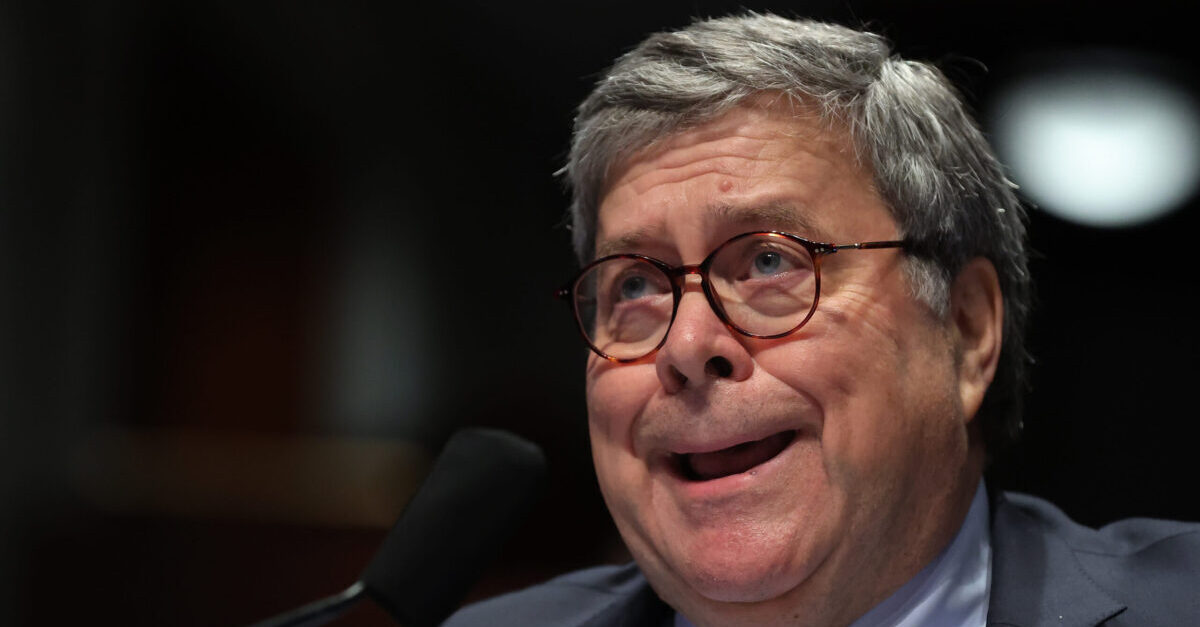
Attorney General Bill Barr is being sued for his role in the controversial Lafayette Square tear-gassing of Black Lives Matter protesters earlier this summer. But Barr says he cannot be sued over that incident because he’s entitled to qualified immunity.
“Following days of unrest in the nation’s capital, on June 1, 2020, law enforcement officers dispersed a large crowd that had gathered in Lafayette Square across from the White House,” Barr’s memo filed Wednesday begins. “In their complaint, plaintiffs allege that the Attorney General gave the order to clear the park, which plaintiffs claim violated their constitutional and statutory rights.”
The lawsuit filed by Black Lives Matter and a coalition of various civil rights and civil liberties organizations is premised on a Bivens action as well as two rarely used federal statutes–42 U.S.C. §1985(3) and 42 U.S.C. §1986–conspiracy to interfere with civil rights and neglecting to prevent the deprivation of rights, respectively.
A Bivens action is the the lone remedy for suing a federal agent who deprives someone of their constitutional rights. Effectively similar to a 42 U.S.C. §1983 civil rights claim, the Bivens right of action is the result of a long-eroded Supreme Court decision from 1971–whereas §1983 claims are enshrined in statute and are used to file civil rights lawsuits against state and local officers, employees and/or agents.
In Bivens v. Six Unknown Named Agents, the Supreme Court found that Federal Bureau of Narcotics agents violated the Fourth Amendment rights of Webster Bivens by entering his home, searching it and then arresting him without a warrant. The high court threw down the gauntlet against this fairly common and illegal law enforcement practice—not only tossing the drug charges but allowing Bivens to sue for redress and damages by finding an implied right because the right violated by federal agents was sacrosanct under the Bill of Rights and the U.S. Constitution.
While Bivens actions are increasingly difficult to win, the statute-based claims against Barr will be almost impossible to win due to the vertiginous uphill battle that plaintiffs must wage–and the decidedly unequal ground on which they fight such fights–in order to prove a government conspiracy against someone’s constitutional rights.
Barr, however, can almost certainly rest assured that the merits of those already unlikely claims never even see the light of a courtroom due to the doctrine of qualified immunity.
“The Attorney General maintains that the claims against him are not viable and, as is his right, is preparing to file a motion to dismiss that will assert several threshold defenses from suit, including qualified immunity,” the Wednesday memo notes.
And, Barr says, the Black Lives Matter plaintiffs should not be allowed to litigate discovery issues before the lawsuit against him is dismissed. Earlier this month, the plaintiffs filed an amended complaint and a motion for expedited discovery that sought to put an administrative pause on any qualified immunity determinations before the full suite of likely government defendants is added to the docket.
Barr claims this request is out-of-order [emphasis in original]
Plaintiffs fail to demonstrate that they are entitled to a stay of the Attorney General’s forthcoming motion to dismiss the individual capacity claims against him. Even if plaintiffs obtain early discovery and decide who they might want to sue, that would ultimately make no difference to the resolution of the Attorney General’s dismissal motion, which will depend solely on his own alleged conduct and not the identity, or conduct, of any other person. There is simply no justification for holding the Attorney General’s entitlement to a swift resolution of the individual capacity claims against him hostage to the outcome of a dispute over discovery matters immaterial to his motion to dismiss. Indeed, the primary grounds for dismissal the Attorney General will rely on—qualified immunity and the absence of a Bivens cause of action—are threshold barriers to suit that must be decided at the earliest possible stage of litigation, prior to any discovery. Simply put, plaintiffs have it backward: where qualified immunity and the recognition of a Bivens cause of action are at issue, it is discovery—not the resolution of those threshold issues—that should be stayed. Plaintiffs’ motion should be denied.
“A stay of a named defendant’s dispositive motion pending the discovery of ‘John Doe’ defendants’ identities is nearly unheard-of,” Barr’s memo continues. “Indeed, the more typical course for pretrial proceedings is the opposite approach: a stay of discovery pending the resolution of the defendant’s dispositive motion. That is not only the norm—but effectively required—where an individual government defendant asserts his entitlement to qualified immunity.”
Barr’s invocation of the increasingly-criticized doctrine quickly drew criticism.
“I look forward to seeing the DOJ’s argument that it was unclear whether you’re allowed to tear gas people for no good reason,” civil rights attorney Sasha Samberg-Champion remarked.
The modern version of qualified immunity holds that: government officials are absolutely shielded from lawsuits seeking money damages unless a plaintiff pleads facts showing (1) that the official violated a statutory or constitutional right, and (2) that the right was “clearly established” at the time of the challenged conduct.
Immigration law expert Aaron Reichlin-Melnick similarly weighed in with a sarcastic take on Barr’s pre-trial defense:
“It’s not clearly established that you’re not allowed to tear gas people for a photo op.”
— Aaron Reichlin-Melnick (@ReichlinMelnick) August 12, 2020
Read Barr’s full memo below:
Barr Claims Qualified Immunity by Law&Crime on Scribd
[image via Chip Somodevilla/Getty Images]